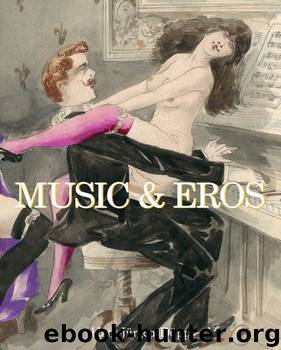Music and Eros by Hans-Jürgen Döpp

Author:Hans-Jürgen Döpp [Döpp, Hans-Jürgen]
Language: eng
Format: epub
Tags: Art, Subjects & Themes, Erotica, Human Figure, Techniques, Painting, Asian, Sculpting, General
ISBN: 9781783107025
Google: cG2lCgAAQBAJ
Barnesnoble:
Publisher: Parkstone International
Published: 2015-09-15T00:00:00+00:00
Romantic lithograph, c. 1835.
Excerpt from the series “Bigarrure”, 1792.
Henri de Toulouse-Lautrec, Jane Avril, 1893.
Music and Early Experiences
Passion brings suffering! – who pacifies
An anguished heart that has lost too much?
Where are the hours that passed so quickly?
In vain the fairest did you gain from fate!
Sad is the mind, confused the efforts,
The glorious world, how its sense dies.
There hovers music on angels’ wings,
Intertwined in a million sounds,
Piercing man’s heart to its innermost core,
To fill him with eternal beauty:
The eye moistens, feels a higher longing
The divine power of sound and tears.
And so the lightened heart soon learns,
That it still lives and beats and wants to,
So grateful for the gift
Offers itself wilfully.
And then it was felt – oh may it stay forever! –
Twofold bliss of sounds and love.
This poem entitled Atonement, written by Johann Wolfgang von Goethe, in August of 1823 – dedicated to the Polish piano virtuoso Madame Szymanowska – expresses the deeply moving effects of sound. The creation of this poem falls into a time of Goethe’s life when he was involved in an unhappy affair with Ulrike von Leventow. Frieda Teller points out that because of the separation, reality had lost its meaning.[72] Music helps him to put some life into suppressed fantasies. Music guarantees the “twofold bliss of sounds and love.”
It is an unsolved mystery why music has such an enchanting, forceful and moving effect on people. Everyone wants to play, listen to and enjoy music. But can it be understood? Music is difficult to understand in verbal terms. Already Nietzsche said that “language...can never express the innermost qualities of music”.[73] Eissler corroborates this when he writes that “music pushes forward with such archaic intimacy that any attempt to translate music into rational syntax must fail”.[74]
Music can not be translated into words. The world of pure sound can not be understood with the main instrument of logical thinking. This is what Freud calls the “secondary process of the psyche”. This fact may explain the special place music holds among art forms.
In Germany, it was the Romantic Movement – found in the works of Wackenroder, Tieck, Novalis, E.T.A. Hoffmann and Jean Paul Vertreter – that developed a particular affinity towards music. They viewed language as an inadequate way of communicating deep human emotions. They believed that music was the artistic medium which could express that which could not be explained, the mysterious, the ambiguous, the unknown depths. While Kant still viewed music as one of the lesser arts, the aforementioned considered it a high art form. Music as an art together with poetry form a unified whole. To Jean-Paul, music was “romantic poetry for the ear”.
If it obviously is the unconscious psyche that is moved by music, then musical research is a genuine psychoanalytical task, even though the medium of psychoanalysis is language. Science does not uncover the origins of human creativity and creative power by looking at the gods of Mount Olympus (i.e. in the underworld), but in humankind’s innermost being. Musical creations are “human products of the soul, creations of the mind, voices of his inner self.
Download
This site does not store any files on its server. We only index and link to content provided by other sites. Please contact the content providers to delete copyright contents if any and email us, we'll remove relevant links or contents immediately.
| Erotica | Human Figure |
| Landscapes & Seascapes | Plants & Animals |
| Portraits | Religious |
| Science Fiction & Fantasy | Women in Art |
The Secret History by Donna Tartt(16611)
Red Sparrow by Jason Matthews(4654)
Harry Potter 02 & The Chamber Of Secrets (Illustrated) by J.K. Rowling(3289)
In a Sunburned Country by Bill Bryson(2941)
Figure Drawing for Artists by Steve Huston(2792)
The Daily Stoic by Holiday Ryan & Hanselman Stephen(2703)
Drawing Cutting Edge Anatomy by Christopher Hart(2672)
The Roots of Romanticism (Second Edition) by Berlin Isaiah Hardy Henry Gray John(2565)
Japanese Design by Patricia J. Graham(2552)
Make Comics Like the Pros by Greg Pak(2421)
Stacked Decks by The Rotenberg Collection(2267)
Harry Potter and the Deathly Hallows (7) by J.K. Rowling(2213)
On Photography by Susan Sontag(2128)
Draw-A-Saurus by James Silvani(2102)
Tattoo Art by Doralba Picerno(2080)
Foreign Devils on the Silk Road: The Search for the Lost Treasures of Central Asia by Peter Hopkirk(2053)
The Traveler's Gift by Andy Andrews(2008)
Churchill by Paul Johnson(2006)
Drawing and Painting Birds by Tim Wootton(1997)
